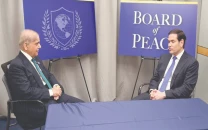‘Pained’ by plight: Pakistani inmates evoke Indian court’s mercy
Indian chief justice appeals to Zardari to release Sarabjit Singh.

President Asif Ali Zardari’s rare visit to India has certainly created the climate for pursuing better relations between the arch-rivals, specifically for the hundreds of prisoners languishing in each other’s jails.
On Tuesday, India’s Supreme Court said it was ‘pained’ by the plight of mentally disabled Pakistanis languishing in Indian jails, giving the government three weeks to find out how they can be repatriated, the BBC reported.
Justice RM Lodha said such cases should be given ‘priority’ when top leaders from the two countries meet. The judge said he was referring to 21 prisoners, 16 of whom are “mentally unsound and five are deaf and dumb”.
Earlier, the Indian Supreme Court freed on bail an 80-year-old Pakistani doctor convicted for a 1992 murder after President Asif Ali Zardari’s short but ‘fruitful’ visit. Virologist Khalil Chishti was ordered not to leave India until the court had decided on his appeal.
‘Proof of identity’
The court’s bench, headed by Justice RN Lodha, on Tuesday asked the government “why mentally unsound Pakistani prisoners who have completed their sentences should not be repatriated?”
“Should such matters not be taken up at the highest level when the heads of the state meet?” Justice Lodha asked.
The government says many of the Pakistanis are still in jail even after they have served their sentences because they do not have proper identifications.
It says these people cannot be sent back without “a proper proof of identity”.
At least 250 Pakistani nationals are being held in Indian jails, some for many years, with one case involving a prisoner behind bars for more than 40 years.
Reciprocity requested
Meanwhile, Indian Chief Justice Markandey Katju appealed to President Asif Ali Zardari on Tuesday to release Indian national Sarabjit Singh, who is being held in a Pakistani jail, The Indian Express reported.
In a letter addressed to Zardari through the Pakistan High Commissioner to India, Katju said Zardari’s visit to India and Ajmer Sharif had created a climate for good relations between the two countries.
“I am appealing to you to order the release of Sarabjit Singh and his return to India as a humanitarian gesture, exercising your power of pardon as the Pakistan President,” Katju wrote in his letter.
“By doing so you will add to the excellent impression among Indians created by your recent visit to Delhi and Ajmer Sharif,” he added.
Katju also mentioned that Zardari had earlier honoured an appeal made by the bench of the Indian Supreme Court (of Justice Gyan Sudha Mishra and Katju) to release Gopal Das, an Indian who had spent 27 years in Pakistani jails.
Katju concluded his appeal by quoting Portia’s speech in Shakespeare’s ‘Merchant of Venice’ on the merits of mercy.
Published in The Express Tribune, April 11th, 2012.



















COMMENTS
Comments are moderated and generally will be posted if they are on-topic and not abusive.
For more information, please see our Comments FAQ